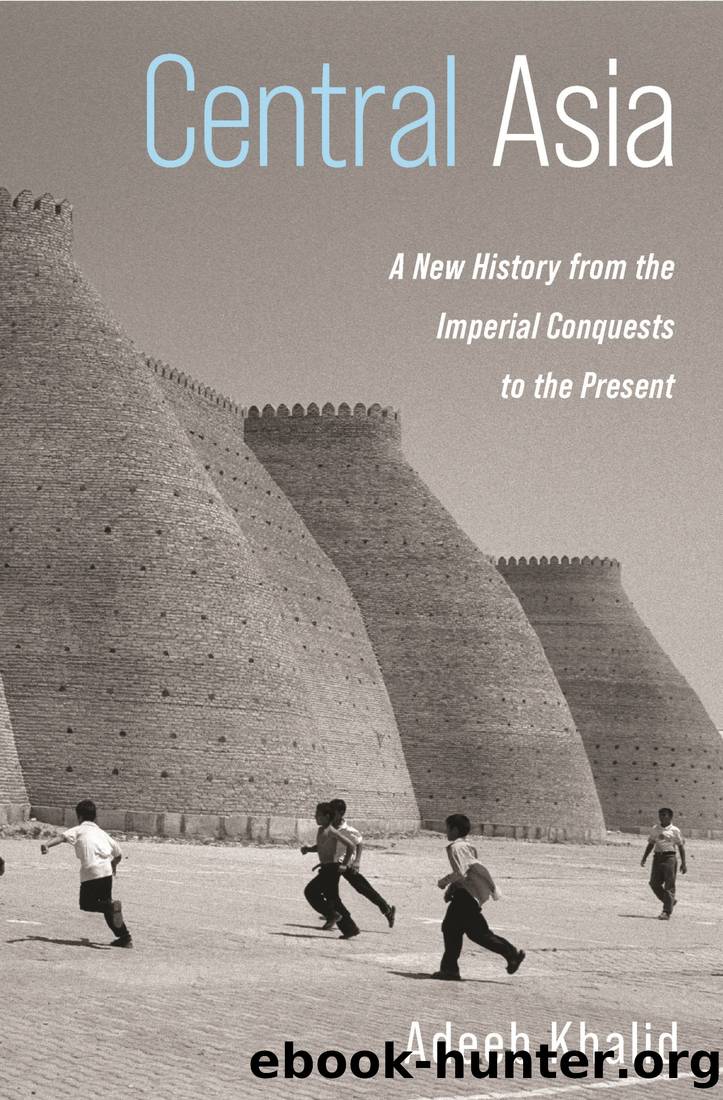Central Asia: A New History From the Imperial Conquests to the Present by Adeeb Khalid

Author:Adeeb Khalid [Khalid, Adeeb]
Language: eng
Format: epub
Tags: Asia, Central Asia, China, Communism & Socialism, Ethnic Relations, History, Imperialism, Islam, Political Ideologies, Political Science, Russia & the Former Soviet Union
ISBN: 9780691220437
Google: 7OgJEAAAQBAJ
Amazon: B08SJ5FH3L
Publisher: Princeton University Press
Published: 2021-06-01T03:00:00+00:00
But Stalin had other concerns. Once he had signed the Treaty of Friendship and Alliance in August 1945, Stalin had little use for the rebellion in Xinjiang. He forced the ETR to sue for peace and negotiate a ceasefire. The GMD had seen the uprising simply as âthe treachery of the Ili nationalitiesâ and a result of Soviet machinations, but it was relieved at the offer and happy to begin peace negotiations.
Alikhan Tora was unhappy, and he persisted in his demands for the continuation of military action. Eventually, the Soviets got sick of him. In June 1946, he was summoned to the Soviet military headquarters in Ghulja and told that Usmon Yusupov, the head of the Uzbek Communist Party, wanted to meet him. Alikhan Tora was put in a Soviet military vehicle, driven across the border to Almaty, and flown to Tashkent, where he received an official welcome. After the welcome, however, he was taken into custody and interrogated for several months. It was not an auspicious time in the Soviet Union for people under interrogation, but Alikhan Tora survived. He was eventually allowed to live in a neighborhood in Tashkentâs old city, where he spent his time practicing traditional medicine, writing, and teaching. He gave lessons on Islam in underground settings and wrote âfor the desk drawerââthat is, works that could not be published in Soviet conditions. His books included a biography of the Prophet Muhammad and a memoir of his time in Eastern Turkestan that unfortunately stops short of his ascension to power. He died only in 1976.17 We know all this now, but at the time, Alikhanâs disappearance from Ghulja was completely unexplained.
Even before his removal from the scene, Alikhan Tora had lost a great deal of his influence within the government to younger men of a more secular and modernist bentâmany of whom had lived and been educated in the Soviet Union. The most prominent among them was Ãkhmätjan Qasimi (b. 1914). Details about his life are few, but he was born in Ghulja and orphaned at an early age. An uncle took him to the Soviet Union in 1926 and placed him in a boarding school for orphans in Jarkent. He attended educational institutions in Almaty, Tashkent, and Moscow, although there are conflicting reports about which university he attended in the Soviet capital.18 He returned to Xinjiang only in 1942, just as Sheng broke with Moscow. Qasimi was promptly arrested and spent over a year in various jails. He was released by Wu in 1944 and eventually made his way to Ghulja, where he began to work for the newspaper published by the ETR. His colleagues soon discovered his education and mastery of Russian, and he rose rapidly to prominence. He led the ETR delegation when it began holding peace talks with the GMD in the summer of 1945, and he inherited the unquestioned leadership of the government after Alikhan Toraâs disappearance the following year. By the autumn of 1945, overt references to Islam had disappeared from the proclamations of the ETR.
Download
This site does not store any files on its server. We only index and link to content provided by other sites. Please contact the content providers to delete copyright contents if any and email us, we'll remove relevant links or contents immediately.
| Africa | Americas |
| Arctic & Antarctica | Asia |
| Australia & Oceania | Europe |
| Middle East | Russia |
| United States | World |
| Ancient Civilizations | Military |
| Historical Study & Educational Resources |
The Story of China by Michael Wood(960)
Mr. Selden's Map of China by Timothy Brook(811)
Philippines--Culture Smart! by Culture Smart!(711)
Heroic Hindu Resistance To Muslim Invaders (636 AD to 1206 AD) by Sita Ram Goel(690)
Akbar: The Great Mughal by Ira Mukhoty(673)
First Platoon by Annie Jacobsen(664)
Vedic Physics: Scientific Origin of Hinduism by Raja Ram Mohan Roy(663)
The Meaning of India by Raja Rao(662)
Food of India by unknow(661)
Banaras by Diana L. Eck(650)
India--Culture Smart! by Becky Stephen(629)
China Unbound by Joanna Chiu(628)
North of South by Shiva Naipaul(626)
Mao's Great Famine: The History of China's Most Devastating Catastrophe, 1958-1962 by Frank Dikötter(614)
Insurgency and Counterinsurgency by Jeremy Black(595)
The Genius of China: 3,000 Years of Science, Discovery, and Invention by Robert Temple(594)
How to Be a Modern Samurai by Antony Cummins(587)
A History of Japan by R.H.P. Mason & J.G. Caiger(586)
The Digital Silk Road by Jonathan E. Hillman(581)
